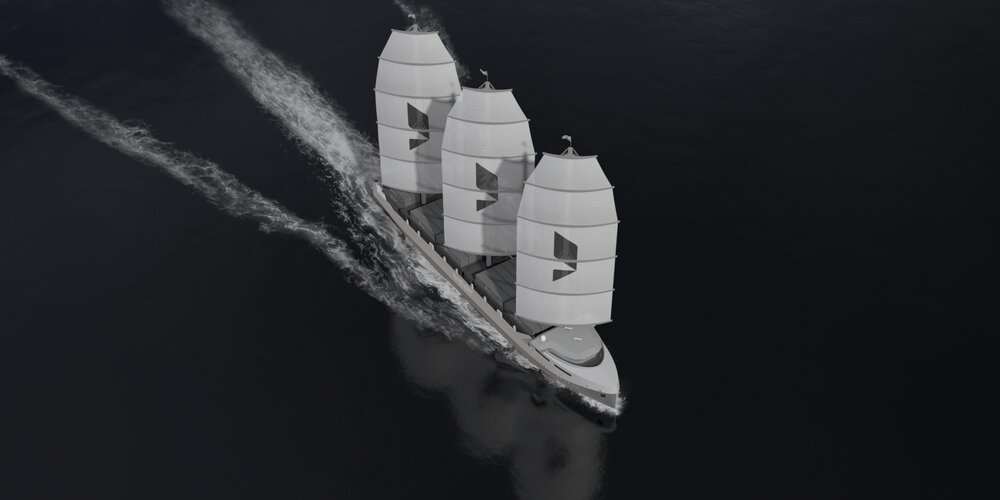Browse our services
Explore how Brookes Bell can help you
Find an expert
Meet our team, find and expert and connect
Contact us
Get in touch, we're here to help

Veer Corporation, a maritime startup based in the Bahamas, is making headway with its innovative approach to zero emissions container vessels. The company's ambitious project aims to revolutionise oceanic transport by integrating wind propulsion with hydrogen fuel cell technology, setting a new standard for sustainable maritime operations.
In October 2022, Veer received Approval in Principle (AiP) from the American Bureau of Shipping (ABS) for its groundbreaking ship design, marking a critical step towards the realisation of their zero-carbon shipping vision.
Cutting-Edge Design and Technology
Veer's first of six total vessels, ‘Design Nº1’, embodies a fusion of advanced technologies. The 100-metre-long container vessel features DynaRig sails for wind propulsion combined with green hydrogen fuel cells. This dual approach ensures that the vessel operates with absolute zero emissions, capable of crossing oceans without relying on fossil fuels.
The zero-carbon initiative is part of a broader trend towards sustainable shipping. Wind propulsion, once considered a niche technology, is gaining traction in the industry to maintain operational efficiency while reducing the load on the main engines, therefore cutting fuel use and the resulting carbon emissions. In Veer’s case, this means reducing the reliance on its primary hydrogen propulsion system.
According to the International Windship Association (IWSA), in March 2024 there were 37 vessels installed with wind-propulsion technology, with 22 installations in the previous 12 months alone. The total fleet size of wind-capable and wind-ready vessels now total 2.5 million dwt, marking a significant progression in the technologies real-world take-up. Veer’s zero-emission ships are set to play a significant role in this transformation, offering a viable and environmentally friendly alternative to conventional shipping.
Hydrogen fuel cells are emerging as a promising solution for reducing carbon emissions in the shipping industry. Hydrogen fuel cells generate electricity through a chemical reaction between hydrogen and oxygen, producing water and heat as the only byproducts. As global environmental regulations become more stringent and the push for sustainable practices intensifies, hydrogen has the potential to offer a clean and efficient alternative to traditional marine fuels, if it can be made a large-scale reality with the supporting production and storage infrastructure.
Brookes Bell’s Involvement in Project Veer
Brookes Bell has provided project management and consultancy support to Project Veer from its inception. Together with Naval Architects, Alan C. McClure Associates, Brookes Bell has supported the design development leading to ABS AiP, and the development of a comprehensive shipyard tender package. A well-qualified European shipyard has been selected, and Brookes Bell’s role is now shifting to shipyard supervision through the construction phase, anticipated to begin Q1 2025.
Elliott Tulloch, Senior Master Mariner with Brookes Bell, said recently "Veer has positioned itself as the clear leader in clean shipping, bypassing incremental approaches to carbon reduction, instead going directly to the goal of zero-emission commercial shipping using available, mature technologies."
Further, Tulloch said "Brookes Bell, as a leading scientific and technical consultancy, supports its clients to develop and implement cutting edge technologies to meet emission reduction goals."
Over the past year, Project Veer has progressed significantly. What started as a conceptual design has now matured into a tangible project poised to demonstrate how zero-carbon container shipping is a real possibility. This progress underscores the innovative approach of combining wind propulsion with hydrogen fuel cells, a technology that, while established in land-based vehicles, is pioneering in its application to large marine vessels. With only a handful of vessels operating on hydrogen globally, Project Veer stands to become a role model for clean shipping’s practicality.